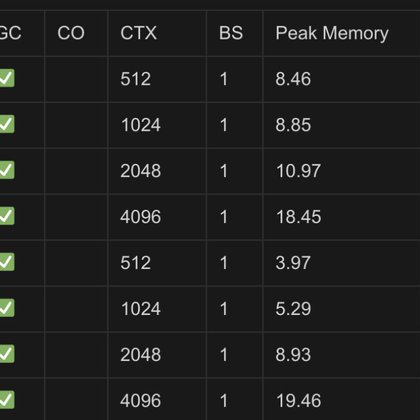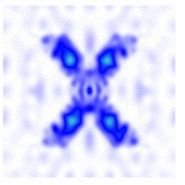
Luca Papariello
@LPapariello
Followers
45
Following
803
Media
0
Statuses
28
Senior Data scientist @Bip_Group. Once physicist.
Joined May 2020
🤗 @HuggingFace’s most impactful contributors you should follow [January 2025] : https://t.co/93lSKxGgxk 🏛️ Top 10 Model downloads: 👏 @jonatasgrosman , @MaziyarPanahi , #Bingsu , #thenlper , @bartowski1182 , @intfloat , @ZhiyuQu_ , @very_laurie , @vikparuchuri , @LPapariello
3
16
62
🤗 @HuggingFace’s most impactful contributors you should follow [December 2024] : https://t.co/93lSKxGOmS 🏛️ Top 10 Model downloads: 👏 @MaziyarPanahi, @jonatasgrosman, @ZhiyuQu_, @LucaPapariello, @intfloat, @limsanity23, @YosukeHiguchi, @yikuanli8, #thenlper, @Emily_Alsentzer
1
18
78
Today, with @Tim_Dettmers, @huggingface, & @mobius_labs, we're releasing FSDP/QLoRA, a new project that lets you efficiently train very large (70b) models on a home computer with consumer gaming GPUs. 1/🧵 https://t.co/UAsWOLtn7a
answer.ai
We’re releasing an open source system, based on FSDP and QLoRA, that can train a 70b model on two 24GB GPUs.
83
642
3K
I just uploaded a 90 minute tutorial, which is designed to be the one place I point coders at when they ask "hey, tell me everything I need to know about LLMs!" It starts at the basics: the 3-step pre-training / fine-tuning / classifier ULMFiT approach used in all modern LLMs.
76
1K
6K
⚡️Preprint: Why do tree-based models still outperform deep learning on tabular data? We give solid evidence that, on tabular data, achieving good prediction is easier with tree methods than deep learning (even modern architectures) and explore why https://t.co/qft4LgZm0z 1/9
34
448
2K
My teammate Syrine and I created it during the Hugging Face course community event. Thanks to the whole Hugging Face team for organizing such a cool event! 👏🏼
0
0
0
I’m very pleased to see that the LanguageDetector @Gradio app on @huggingface Spaces is among the Spaces of the week 🔥 Demo 🕹: https://t.co/bNbC2sNxo1 Model 🧠:
huggingface.co
1
0
1
I wanted to write some notes and share them via a blog post and #fastpages made the whole process so smooth. Terrific tool! 🔥 👏 to @HamelHusain and all others contributors! The result looks like this 👇 https://t.co/5jWTLOazV3
0
1
5
Do you like Jupyter notebooks? Check out #nbdev and you'll like them even more! 🔥 👉 https://t.co/ssqnRjpSkf
0
0
2
Nice article (for computer people) on the #COVID19 🦠 vaccine.
0
0
2
Check out our preprint "Optimized Observable Readout from Single-shot Images of Ultracold Atoms via Machine Learning" https://t.co/M6t6xsespJ
#coldatoms #quantum #physics #MachineLearning
1
5
8
Extract #quantum #physics from your #coldatoms more efficiently? Use UNIQORN, the Universal Neural-network Interface for Quantum Observable Readout from N-body wavefunctions! https://t.co/8Ax8XgIJii
0
1
2
🎉 Papers with Code partners with arXiv! Code links are now shown on arXiv articles, and authors can submit code through arXiv. Read more: https://t.co/kO6zhWAWGH
44
2K
6K
Super interesting thread
Very proud and excited about my work https://t.co/r5CeTMIgVD with @a_e_cole @GRAPPAinstitute @AmsterdamTheory and Gregory Loges @UWMadPhysics . We present a revolutionarily new way to detect and classify phase transitions using computational topology. Here is a thread:
1
3
22
Very interesting alternative to the well-established #TensorFlow and #PyTorch libraries! #Jax #Elegy
https://t.co/5bf6FN6Upw
towardsdatascience.com
Going beyond TensorFlow, Pytorch, and Keras
0
2
2
Nice piece of work exploiting the capabilities of MCTDH-X!
Rapid Communications: Pathway to chaos through hierarchical superfluidity in blue-detuned cavity-BEC systems https://t.co/OZixorA0nM
0
0
1
Interesting theoretical work on the effectiveness of self-attention. (Preprint: https://t.co/uMOp4iaxTu)
Limits to Depth Efficiencies of #SelfAttention: self-attention is extremely (double-exponentially) depth-efficient, with a maximum depth log_3(width), beyond which further deepening losses this effectiveness relatively to widening. #DeepLearning
https://t.co/gOfEqpKiV2
0
0
1
Using #MachineLearning to extract observables of #coldatom systems from single-shot images. Here a recent talk showing some preliminary results!
Interested in how to optimize the amount of information that you can obtain from measurements of #coldatom #quantum many-body systems? Here's a talk on how to do that using #MachineLearning : https://t.co/HHx6FUTo1W
0
0
2









